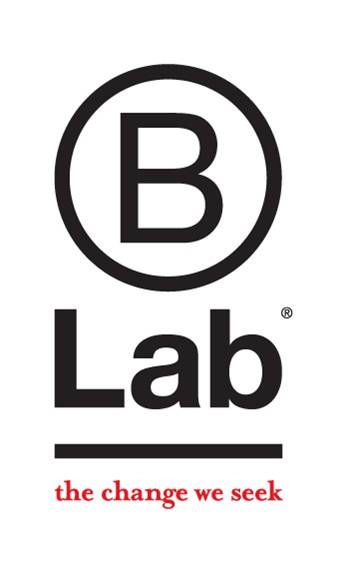
When we first started taking a closer look at benefit corporations, we were really building off of the momentum that began with B Lab, the nonprofit that pushes for Benefit Corporation legislation and certifies B Corps. Little did we know, we’d be interviewing Jay Coen Gilbert, one of the three cofounders of B Lab, on our blog! We were so excited, we added a few extra questions in today’s interview where Jay tells us about the benefits forming a B Corp brings to society and the environment, and that for all companies, it’s most important to take the first step and see where you stand.
1. What’s the source of your passion and inspiration that drove you into your leading role in the Benefit Corporation movement?
B Lab’s three cofounders, Bart Houlahan, Andrew Kassoy and I (Jay Coen Gilbert), all share a passion for using market forces to address society’s greatest challenges. We’ve worked in business for most of our careers and hope to harness the amazing talent, passion and resources we’ve seen there to make a better world. Ultimately, we founded B Lab to serve those entrepreneurs who are using business as a force for good.
More specifically, we identified two systemic challenges that we’re hoping to address. The first is a lack of standards to help us tell the difference between good companies and just good marketing; and the second is existing corporate law that demands that business prioritize shareholder value maximization to the exclusion of the value created for all stakeholders. By working to certify B Corporations, pass benefit corp legislation and promote impact investing with B Analytics, we hope to address some of these challenges and help entrepreneurs make the most positive impact.
 2. What are your thoughts on how the movement is evolving?
2. What are your thoughts on how the movement is evolving?
The movement has seen great progress over the past few years, with the community of Certified B Corporations growing to over 800 companies across 60 industries and 27 countries. Additionally twenty states, including Delaware, California and New York, have now passed benefit corporation legislation and over 10,000 businesses are using the B Impact Assessment to measure and manage their social and environmental performance.
However, there is still a long way to go. All companies should measure what matters, impact. Whether or not they become Certified B Corporations or elect benefit corporation status, it is important to take the first step and see where you stand. Additionally, we need consumers and investors to support companies working to create a better world. Finally, we must grow the community of B Corporations and demonstrate that there is a better way to do business – that it is possible to do well by doing good.
3. What has been the biggest roadblock in pushing this new type of entity and how did you overcome it?
I think the biggest roadblock in passing benefit corporation legislation is helping others understand the need for a new entity. Current corporate law maintains that the sole purpose of corporations is to maximize shareholder profits. Many argue that companies can already do good, as seen in advertising or a different understanding of case law (Ford vs. Dodge). However, it has been confirmed by DE’s Chancellor Strine and other key legal leaders that if companies are to pursue creating a positive public benefit, we need a new entity, like a benefit corporation. Hopefully the passage of the legislation in Delaware, the home of the American corporation, will help pave the way for benefit corporation legislation to pass in all 50 states.
4. What would you say are some of the benefits in choosing a Benefit Corporation over a traditional for-profit or LLC?
The greatest benefit is the legal protection to consider society and the environment. This is an important step in the evolution of the role of business in society. Additionally, investors in benefit corporations are given the ability to hold the company accountable to maintain its mission. Finally, benefit corporations enjoy a market distinction, as consumers, employees and investors can all be sure that this is a company which practices what it preaches.
5. Why go with incorporating as a Benefit Corporation over nonprofit? Can you expand a little bit on why going with a for-profit structure can lead to even greater environmental and social impact?
Government and nonprofits are wonderful, but have proved insufficient to address some of our most challenging problems. Business is the most powerful man-made force on the planet and can therefore do a lot of good. For-profits have the power to scale and attract the best talent, giving them the opportunity to create even greater environmental and social impact.
6. What do you think the future looks like for the benefit corporation movement?
Over time, I believe we will have benefit corporation legislation in all 50 states and a strong community of B Corps helping individuals and communities enjoy greater economic opportunity, society addressing its most challenging environmental problems, and more people finding fulfillment by bringing their whole selves to work.
7. What’s some advice you would give to entrepreneurs considering the benefit corporation structure?
I’d advise anyone, interested in benefit corporations or not, to first take the free B Impact Assessment to measure their impact and see where they stand which is available at bcorporation.net. We manage what we measure and must therefore start tracking our social and environmental impact if we want to see true change. We can no longer define success as just greater profits. That’s obviously important (no margin, no mission) but true success leads to a stronger and healthier community and environment as well.
Find out more about Benefit Corporations at bcorporation.net, tweet @BCorporation, like them on Facebook, and hangout on Google+!
Are you a B-Corporation that would like to be featured on our blog? Or an expert in B-Corps? Email Heather at htaylor@mycorporation.com for more information!